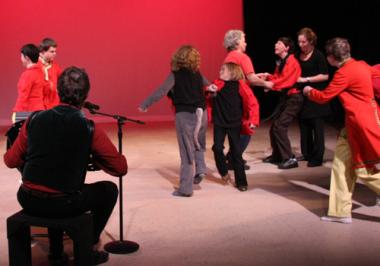“This goes out to those who don’t get a chance
To raise their voices ’cause of the problems we have.
We’ve been held back, we can’t let that go on.
Now it’s time for us to speak out
Let them know who we are
And show them where we stand.”
A tall young man is standing stage center, rapping out those lines. He’s Kyle Riopel, author of the song and a member of the Theatre Adventure Program’s adult troupe. It’s the title number in Raising Our Voices, the project’s spring performance.
TAP is a theater program involving children and adults with disabilities—physical, social, cognitive and communicative. The six-year-old initiative, based at Brattleboro’s New England Youth Theater, is led by Laura Lawson Tucker, an artist with a background in education and movement therapy, and disability specialist Darlene Jenson. The program includes two youth troupes as well as the adult company that’s rehearsing for this week’s performances.
Ranged around Riopel during the rehearsal are his 13 fellow performers, representing “a tremendous diversity of disability,” as Tucker explains during a break. Three are in wheelchairs, two use computerized recording devices for communication, some speak their lines boldly and some need coaching for every cue.
“Our focus is on abilities, not disabilities,” Tucker says. “We get to know each individual and what the challenges are. At the forefront of our minds is what we can do with their abilities.”
The program also includes members without disabilities, or “students who are typically developing,” in TAP’s phrase. But Tucker stresses that “they participate not as helpers, but as students. It’s the same playing field.” And in the program’s “reverse mainstreaming model,” the members with disabilities are the majority, not token participants. Some adult members also work as mentors in the children’s program.
Raising Our Voices is TAP’s first all-original show, a series of vignettes based on the participants’ own experiences. (Last spring’s production was Oklahoma!) One section, a sound-and-picture montage, highlights cast members’ job experiences and their feelings about being in the world and contributing to their community.
The weekly classes include training in movement, pantomime, percussion, costuming and other theater skills. TAP is not about simply providing an activity, Tucker emphasizes. The workshops and the experience of performing are powerful socialization tools and valuable training for practical job skills: “Time management, dependability, reliability, being part of a team effort, learning how to present themselves, figuring out, ‘Oh my God, if I don’t go to class, it really impacts the others, I have to pull my weight.’ There’s this real sense of achievement.”
Watching the rehearsal, I’m struck yet again by the versatility and adaptability of live theater—its ability to bring joy and meaning to a multiplicity of participants and audiences; its capacity for personal fulfillment and common cause, wrapped up in costumes and greasepaint.”
Raising Our Voices: April 1 at 10:30 a.m., April 3 at 6 p.m. (gala fundraiser), New England Youth Theatre, 100 Flat Street, Brattleboro, (802) 246-6398, neyt.org.



